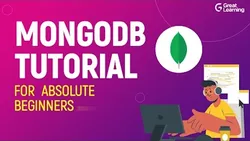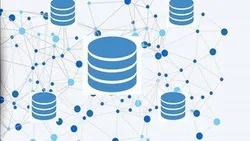
Mongodb Tutorial for absolute beginners 
This online course provides an introduction to MongoDB for absolute beginners. It covers topics such as NoSQL, SQL vs NoSQL, installation of MongoDB, creating databases, collections, documents, and performing CRUD operations. It also covers query and criteria. This course is a great way to get started with MongoDB and learn the basics. It is comprehensive and easy to follow, making it suitable for both beginners and experienced users. ▼
ADVERTISEMENT
Course Feature
![]() Cost:
Cost:
Free
![]() Provider:
Provider:
Youtube
![]() Certificate:
Certificate:
Paid Certification
![]() Language:
Language:
English
![]() Start Date:
Start Date:
On-Demand
Course Overview
❗The content presented here is sourced directly from Youtube platform. For comprehensive course details, including enrollment information, simply click on the 'Go to class' link on our website.
Updated in [April 21st, 2023]
What does this course tell?
(Please note that the following overview content is from the original platform)
➤ Skip Intro: .
Introduction.
Agenda.
Introduction to MongoDB.
Introduction to NoSQL.
SQL vs NoSQL.
Installation of MongoDB.
Create Database.
Create Collection.
Create Documents.
CRUD Operations.
Query and Criteria.
Summary.
We consider the value of this course from multiple aspects, and finally summarize it for you from three aspects: personal skills, career development, and further study:
(Kindly be aware that our content is optimized by AI tools while also undergoing moderation carefully from our editorial staff.)
Welcome to the MongoDB Tutorial for absolute beginners! This course is designed to help you understand the basics of MongoDB and how to use it in your projects.
In this course, you will learn the fundamentals of MongoDB, including its architecture, installation, and basic operations. You will also learn about NoSQL and the differences between SQL and NoSQL databases. Finally, you will learn how to create databases, collections, and documents, as well as how to perform CRUD operations and query and criteria.
Course Overview: This course will provide you with a comprehensive overview of MongoDB and its features. You will learn about its architecture, installation, and basic operations. You will also learn about NoSQL and the differences between SQL and NoSQL databases.
Related Learning Suggestions: To further your knowledge of MongoDB, you can explore topics such as MongoDB Atlas, MongoDB Stitch, and MongoDB Charts. You can also look into MongoDB's other features, such as its security and scalability.
[Applications]
After completing this Mongodb Tutorial for absolute beginners, the user should be able to understand the basics of MongoDB, NoSQL, and the differences between SQL and NoSQL. They should also be able to install MongoDB, create databases, collections, and documents, as well as perform CRUD operations and query and criteria. Finally, they should be able to summarize the course.
[Career Paths]
1. MongoDB Developer: MongoDB Developers are responsible for designing, developing, and maintaining MongoDB databases. They must have a strong understanding of MongoDB's features and capabilities, as well as the ability to write efficient queries and optimize performance. Developing trends for MongoDB Developers include the use of cloud-based solutions, such as MongoDB Atlas, and the use of automation tools to streamline database management.
2. MongoDB Administrator: MongoDB Administrators are responsible for managing and maintaining MongoDB databases. They must have a strong understanding of MongoDB's features and capabilities, as well as the ability to troubleshoot and optimize performance. Developing trends for MongoDB Administrators include the use of cloud-based solutions, such as MongoDB Atlas, and the use of automation tools to streamline database management.
3. MongoDB Consultant: MongoDB Consultants are responsible for providing advice and guidance to clients on the best practices for using MongoDB. They must have a strong understanding of MongoDB's features and capabilities, as well as the ability to provide strategic advice on how to best utilize MongoDB. Developing trends for MongoDB Consultants include the use of cloud-based solutions, such as MongoDB Atlas, and the use of automation tools to streamline database management.
4. MongoDB Data Analyst: MongoDB Data Analysts are responsible for analyzing and interpreting data stored in MongoDB databases. They must have a strong understanding of MongoDB's features and capabilities, as well as the ability to create reports and visualizations to help clients make informed decisions. Developing trends for MongoDB Data Analysts include the use of cloud-based solutions, such as MongoDB Atlas, and the use of automation tools to streamline data analysis.
Course Provider

Provider Youtube's Stats at AZClass
Over 100+ Best Educational YouTube Channels in 2023.
Best educational YouTube channels for college students, including Crash Course, Khan Academy, etc.
AZ Class hope that this free Youtube course can help your Mongodb skills no matter in career or in further education. Even if you are only slightly interested, you can take Mongodb Tutorial for absolute beginners course with confidence!
Discussion and Reviews
0.0 (Based on 0 reviews)
Explore Similar Online Courses

Feature Film Screenwriting: The First Ten Pages

Fundamental Computing Skills for the Digital Middle Age

Python for Informatics: Exploring Information

Social Network Analysis

Introduction to Systematic Review and Meta-Analysis

The Analytics Edge

DCO042 - Python For Informatics

Causal Diagrams: Draw Your Assumptions Before Your Conclusions

Whole genome sequencing of bacterial genomes - tools and applications

Searching for Text in MongoDB

Learning MongoDB - NoSQL database


Start your review of Mongodb Tutorial for absolute beginners